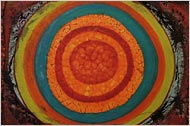No good deed goes unpunished by the bureaucrats
 Donny Johnson is not a nice man. In fact he is a killer and that is why he is in prison. But sometimes bad people do good things. For that the bureaucrats in government are ever vigilant -- to stamp it out.
Donny Johnson is not a nice man. In fact he is a killer and that is why he is in prison. But sometimes bad people do good things. For that the bureaucrats in government are ever vigilant -- to stamp it out.Johnson used the dye from M&M candy to create some paint and he made some paintings. He gave the paintings away to a charity and asked them to use any proceeds from the sale of the paintings to help the children of prisoners. Not a bad thing at all. Johnson took nothing for his work. But prison bureaucrats have punished Johnson. As the saying goes: no good deed goes unpunished.
The petty minded bureaucrats say that regulations forbide any prisoner from engaging in a "business or profession" without the warden's permission and they define business as "any revenue-generating or profit-making activity." Now in this case Johnson made no profit whatsoever and generated no revenue for himself. He gave the paintings to a charity. And they displayed them at an art gallery and have sold 20 of them for $500 each.
Apparently a news article on the prisoner's charity was seen by some inane bureaucrat, Pamela Hooley, a deputy attorney general. Now if deputy attorney generals are not as bright as the attorney general himself then Pamela must be on the level of a plant given the current attorney general (actually presidents seem to appoint the worst people to this position traditionally, Meece, Reno, etc all prove the point). Pamela relished the role of snitch and and sent the article to prison officials who then restricted Johnson's ability to mail his art work to anyone.
Johnson is not allowed art supplies. He makes his own. He buys M&Ms and puts them by color in small jars with a tiny amount of water until the color coating dissolves. He then removes the chocolate. He paints with a hand made brush made of his own hair and uses postcards sent to him as his canvass. He is allowed almost no contact with anyone including guards. He has not even touched another person in 17 years. He says he is in enforced sensory deprivation and he makes his art to bring his own senses back to life. He knew he wasn't allowed to sell his art so he never tried to. He always gave it away. But apparently attempts to do good are no longer acceptable.
It seems odd that the bureaucrats are so petty on this subject that the are twisting the meaning of words just to stop a charitable act. They are claiming the art is a business, not because Johnson is making money from it, but because a charity was able to sell the paintings to help children. Now there are plenty of prisoners of notarity who produce items with some value all the time even if they don't intend to do so. If Sirhan Sirhan, the killer of Robert Kennedy, writes a letter some collector may be willing to purchase it. That others derive profit ought not be the defintion of business. I can see if they argue the prisoner is making a profit but in this case they are really punishing a charity for helping children.
I'm no fan of Johnson's work, at least I haven't cared for anything he's produced that I've seen. But this small minded crap from the prison is really just vindictive and cruel and it punishes the charity, and the children, most of all. The man is in prison for life at least allow him to do some good in the world.
 DiggIt!
DiggIt! Reddit
Reddit Del.icio.us
Del.icio.us

<< Home